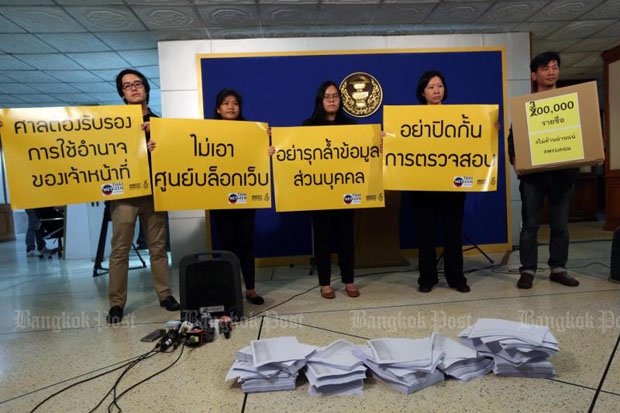
Critics of the newly amended Computer Crime Act said in a forum in Bangkok on Sunday that if the broadened powers of the act are abused, they will immediately petition the Constitutional Court to seek changes.
The amendment was done inappropriately and with broad and ambiguous wording, Yingcheep Atchanont, a project manager at Internet Dialogue on Law Reform (iLaw), said at Thammasat University. "For the time being requests for the court's rulings on possible abuse would be practical."
"As it has already been amended, we will monitor its enforcement. We still have room to seek interpretation from the Constitutional Court. If the law is improperly exercised, we will file such requests," he said.
Mr Yingcheep said he hoped the next government would address the broad criteria and ambiguities in the new law.
He said more than 300,000 people had signed their names to oppose the newly amended law within a couple of days, showing that people were interested in issues concerning freedom of expression and access to information.
Sarinee Achavanuntakul, founder of the Thai Netizen Network, told the forum that even though the amended law passed the National Legislative Assembly (NLA), it would take another 120 days for ministerial regulations to be issued to enforce the law.
She urged concerned parties to monitor the content and expected the government to hold forums to sound out public opinion.
She also called attention to several draft bills, which are awaiting deliberation by the NLA, such as the Cyber Security Bill and a radio frequency allocation bill. She said the government sector had an idea to control mainstream media.
Chavarong Limpattamapanee, president of the National Press Council, said the newly amended Computer Crime Act included many words that were ambiguous and could be broadly interpreted.
However, he said, it had fewer points of possible rights violations than the original version that had been drafted by a previous government.
National human rights commissioner Angkhana Neelapaijit said her commission was most concerned about the judgment of the nine-member cyber-screening panel that would be set up.
She said the new law targeted content that breached national security, order and public morals.
She said the wording of the criteria on which the screening committee would base its judgment was too broad.